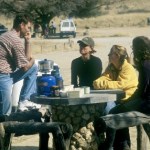South africa
You've heard to story. I'm here to give you a little context.
A pretty typical early handaxe, made by a Homo erectus. This was a big flake made from a bigger rock. The big flake was subsequently flaked to make this handaxe. The word "handaxe" can be spelled about nine different ways.
But in case you haven't heard the story, this is from the press release which is, so far, the only information generally available:
New finds of fossils and stone tools from the archaeological site of Jebel Irhoud, Morocco, push back the origins of our species by one hundred thousand years and show that by…
A City of Death and Misery
Everything I’m about to tell you in this story is true.1 You might not want to read this story while you are alone or while sitting in the dark.2
Kimberley South Africa is said to be the most haunted city in the world, and it certainly is a city with a remarkable and dark history. The culture of Kimberley is constructed from the usual colonial framework on which are draped the tragic lives of representatives from almost every native culture from thousands of kilometers around, as well as the seemingly ubiquitous Europeans with their greed, their unexamined privilege…
In an old colonial-looking restaurant that served ten kinds of steaks, I met up with an experienced explorer and a local farmer, to have dinner and discuss plans for an upcoming research project that would be managed by The Explorer and that would partly be on The Farmer's land, which adjoined a rather extensive and remote wilderness area. I don't remember a lot about the conversation, but one memory of the evening stands out: That was when The Farmer, rooting around in a bag for some cash to tip the waitress, pulled out this big-ass gun ... a small cannon, really ... that was in the way.…
Wildlife of Southern Africa , by Martin Withers and David Hosking, is new (August 2011) and good. If you are planning a trip to South Africa, Namibia, Botswana or anywhere nearby, or if you live there and like to go to the bush sometimes, consider it.
This is a pocket guide, it is small, has good photographs, is inexpensive, and accurate.
In my opinion, if you are travelling around Africa looking at wildlife, you will need a set of more specialized guides (which I've discussed at length elsewhere on this blog, see below), but this is a good extra to carry along or to have handy, depending…
When wildebeest, such as those famous for crossing the Mara River in Tanzania during their annual migration, run into a crocodile or some other danger it is often the first time they've seen that particular thing. This is because most wildebeest don't live very long so many are on their very first migration. One wonders what would happen if you killed all of the wildebeest migrating in a particular year and set new ones out on the landscape to take their place. Would the migration continue?
Probably not, initially. Something like this did in fact happen on the Botswana-South Africa-…
I started to work in Africa in the mid 1980s. Since I had been admitted to a graduate program that was heavily involved with work in Kenya, it would make sense that I'd work there, but I was well aware of the fact that there would be no work at Koobi Fora until the Koobi Fora monograph was done, since those in charge of that research felt a responsibility to get what they had done published before collecting more data from the field. I had the opportunity to work in South Africa as well, and there were good reasons for me to do that, but there was one very large reason not to: Apartheid.…
Formerly known as Day of the Vow, as South African holiday, and a time of reflection on dramatic historical and cultural changes.
In 1836 about 400 or so southern African farmers of European Ancestry, known as Voortrekkers, killed about 3,000 Zulu out of an army of 10,000 or so. It was a turning point in South African history. Prior to what became known as the Battle of Blood River, the Voortrekkers made a pact with god; Let us win this battle and we'll make this an annual holiday and build a church and stuff. It is possible that god needed a church and a day off, so he let them win. It's…
Lady Duff Gordon (Lucie) traveled to Cape Town in the 1860s, and chronicled her trip with letters home, which are available from various sources as "Letters from the Cape."
From that volume:
From ship board on the way to the Cape:
The children swarm on board, and cry unceasingly. A passenger-ship is no place for children. Our poor ship will lose her character by the weather, as she cannot fetch up ten days' lost time. But she is evidently a race-horse. We overhaul everything we see, at a wonderful rate, and the speed is exciting and pleasant... We tried to signal a barque yesterday, and…


